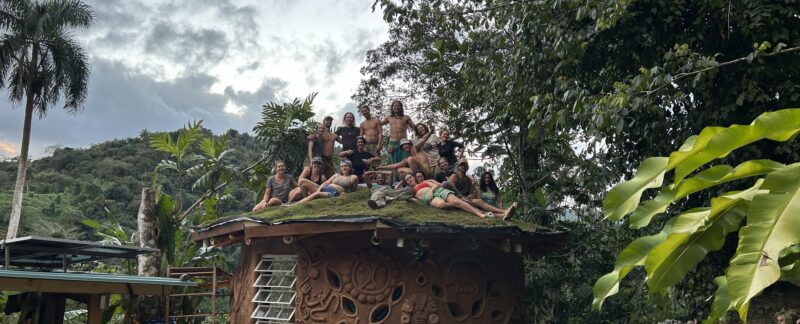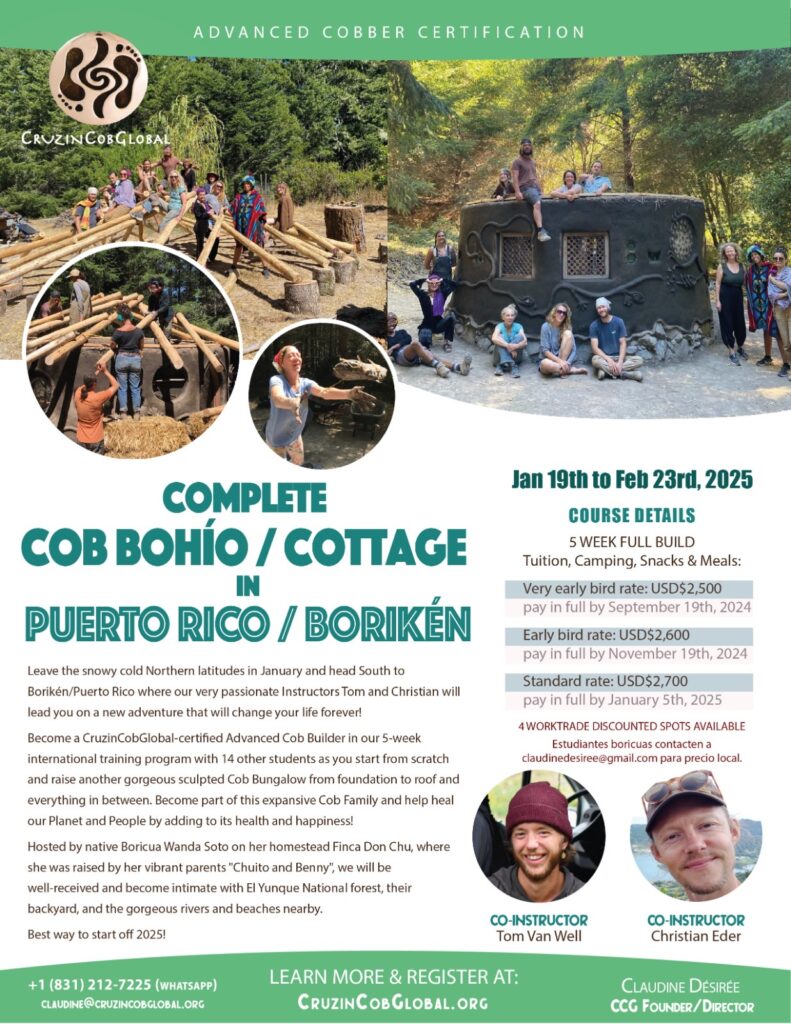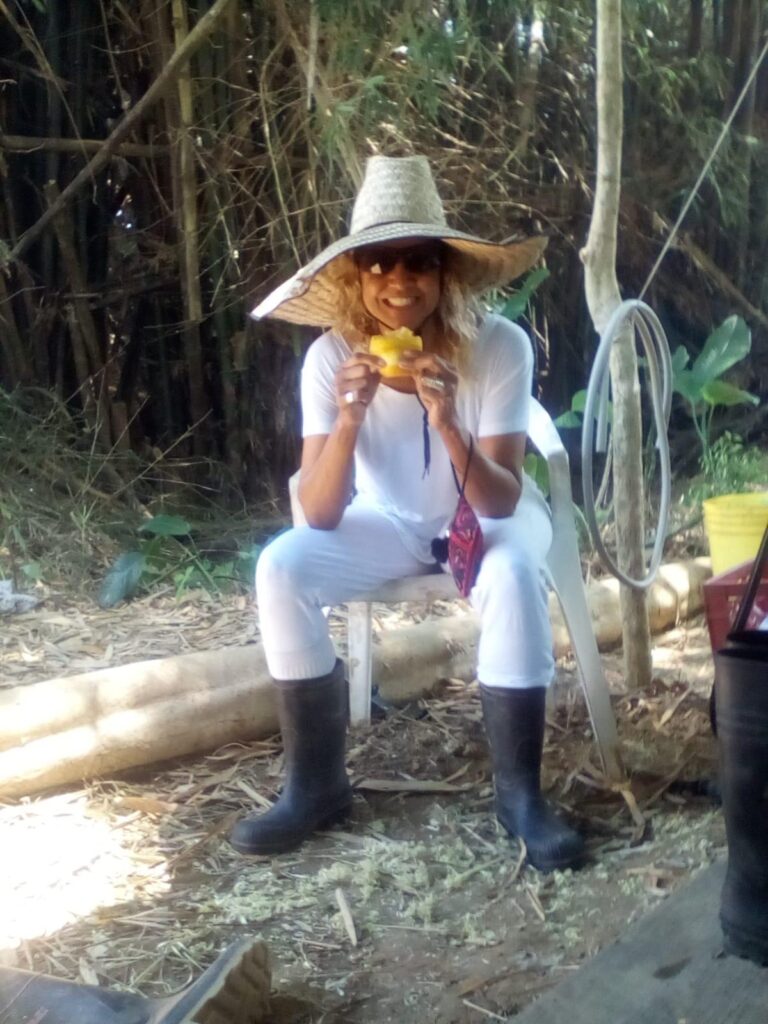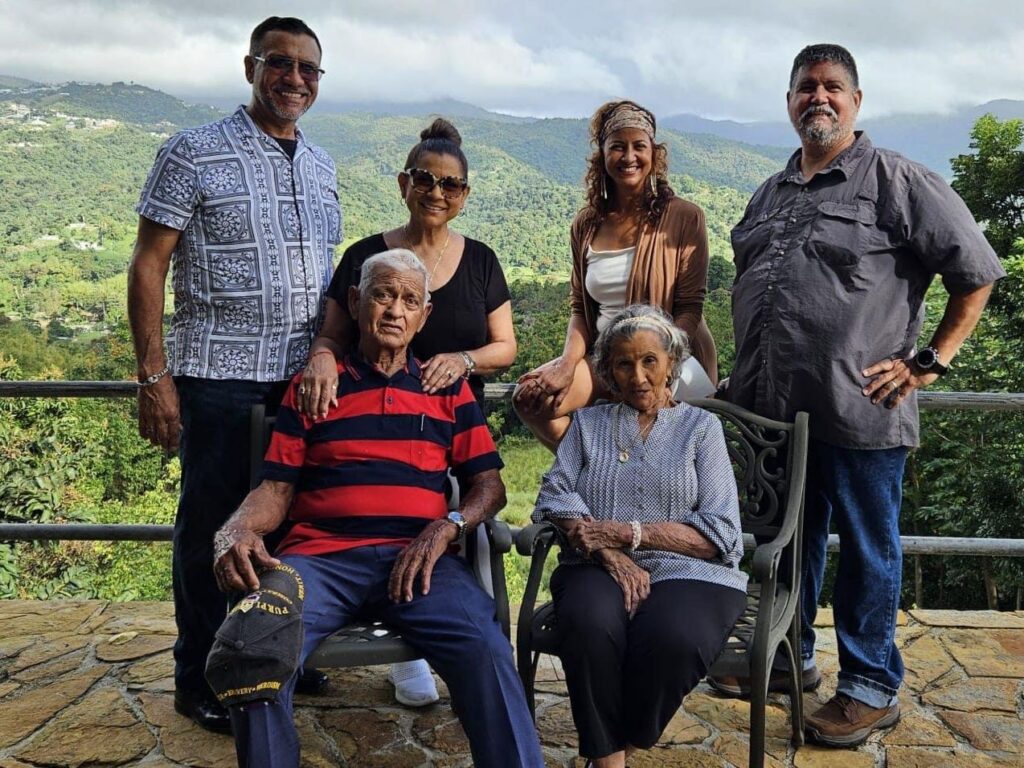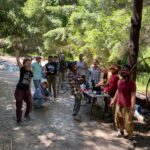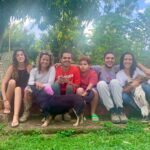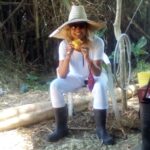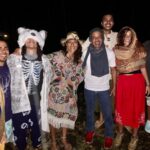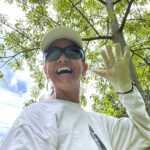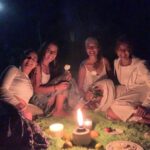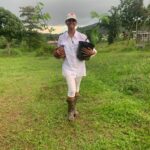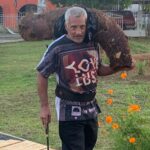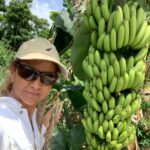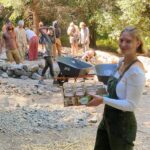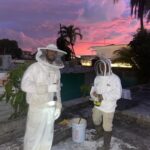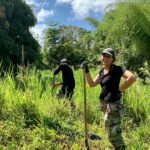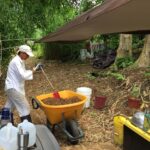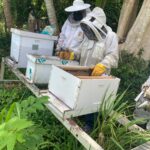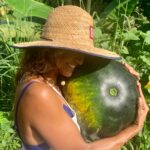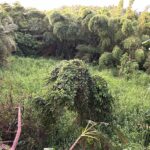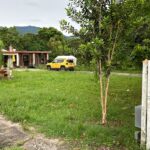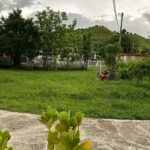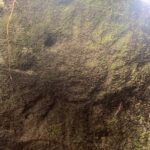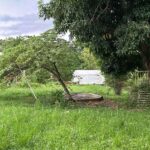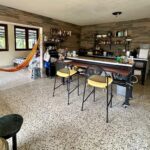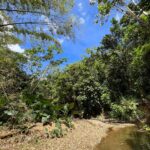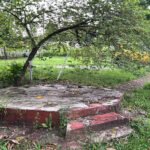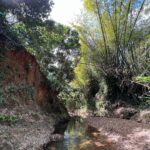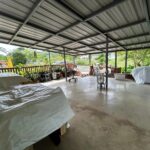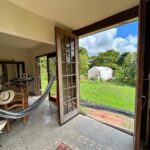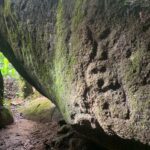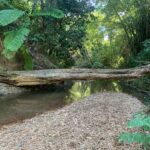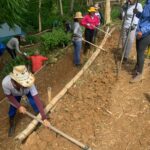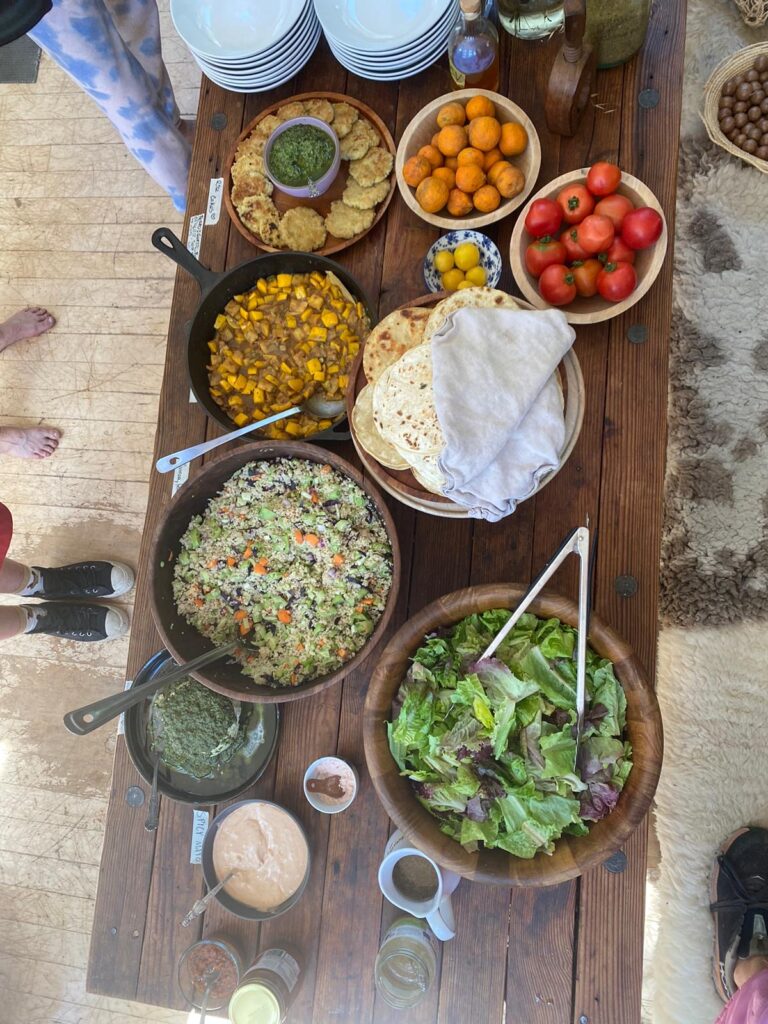Date/Time
Date(s) - Sunday, January 19, 2025 - Sunday, February 23, 2025
OUR HOST
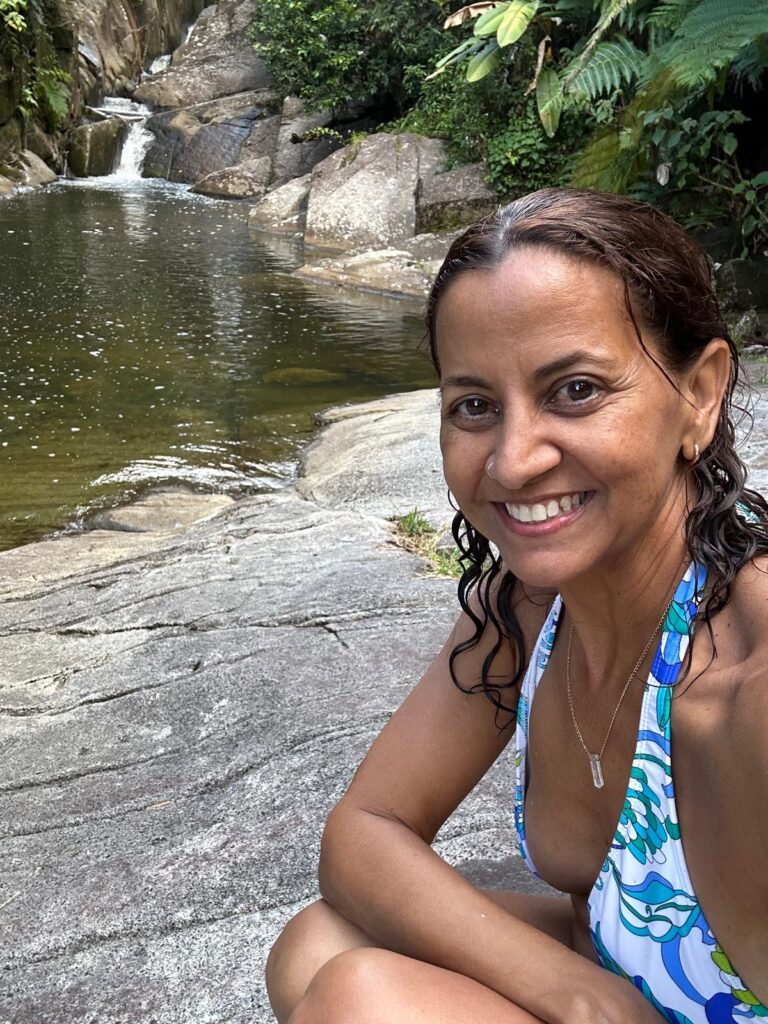 My name is Wanda Soto Algarín, daughter of two great altruistic beings, “Chuito”, US Army Veteran and “Benny”, retired social worker and the youngest of four siblings, including Alberto, Freddy and Nancy. While I was conceived in France and born in Massachusetts, Finca Don Chu (location of the workshop) has been my home since the age of 13.
My name is Wanda Soto Algarín, daughter of two great altruistic beings, “Chuito”, US Army Veteran and “Benny”, retired social worker and the youngest of four siblings, including Alberto, Freddy and Nancy. While I was conceived in France and born in Massachusetts, Finca Don Chu (location of the workshop) has been my home since the age of 13.
I always knew I had to do what made me completely happy in my life work. That was when I travelled to the countryside to collect naturally triple-filtered water from El Yunque and started creating hair rinses with native rosemary and lemon, and masks from avocado, papaya and other temporal fruits, and decided I wanted to be a cosmetologist. I have been working in the field of beauty for over 30 years now, trained as an educator in John Paul Mitchell Systems, where I learned about using natural resources in a responsible and sustainable manner to create healthy beauty products, like at his Hawaiian Sustainable Farm. I am also a certified beekeeper. My goal has always been to work with consciousness and respect for Mother Nature.
My parents have always been my source of inspiration for the creation and arduous work of Finca Don Chu and my family’s trust and confidence have been the engine for the continued development of the Finca’s mission and first project: “Healthy
Artistry: A Learning & Workshop Center for Healing through the Arts”. For this project, friends and family joined forces to plant and connect with Nature and with each other and ourselves using rituals and other healing spaces.
While I make great efforts to bring awareness to the community and the Elders, I know that Faith, Hope & Compassion accompany me. I consider myself a warrior conscious of myself and all that surrounds me, and most importantly an eternal student learning and unlearning to continue germinating spaces of security, hope and healing with the strength of Mother Nature.
- Volunteers
- The Tribe
- Farmer Wanda
- PR Fiesta
- Beekeeper Wanda
- Boricua rituals
- Osvaldo the Farmer
LOCATION
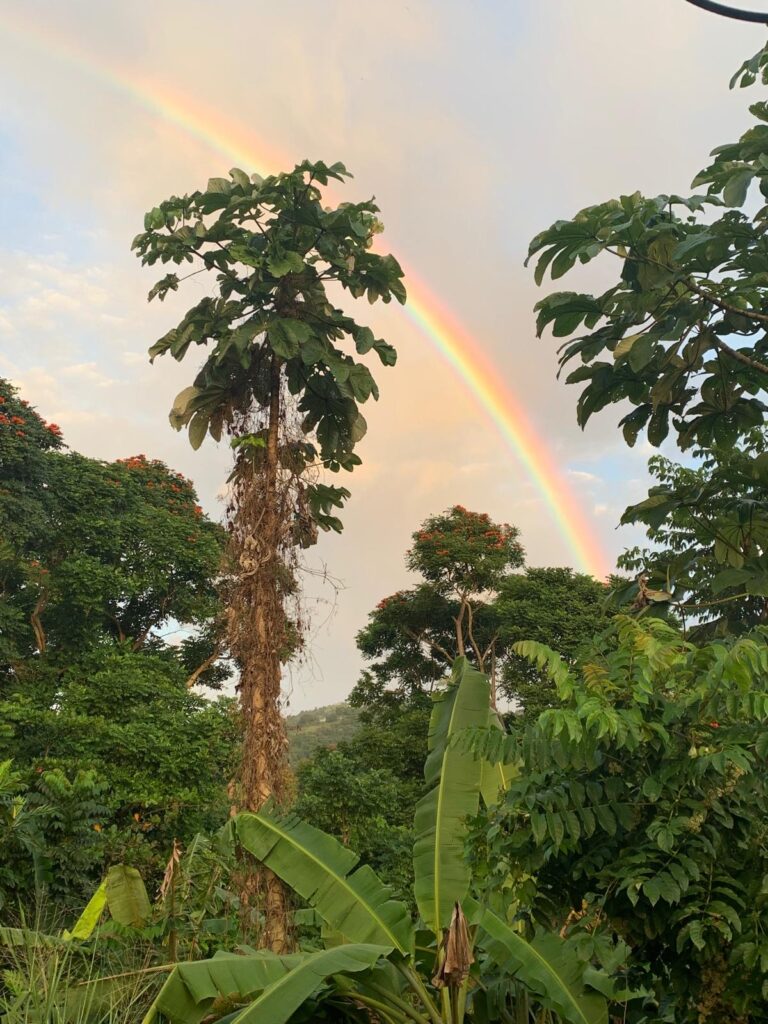 The farm is located at the lap of El Yunque National Forest, facing southeast Puerto Rico, and is known as the virgin side of the forest. We have three rivers nearby: Rio Blanco, Rio Cubuy and Rio Sabana, all ideal for hiking, swimming and bird watching. Naguabo is surrounded by the beautiful cities of Las Piedras, Humacao, Ceiba and Luquillo.
The farm is located at the lap of El Yunque National Forest, facing southeast Puerto Rico, and is known as the virgin side of the forest. We have three rivers nearby: Rio Blanco, Rio Cubuy and Rio Sabana, all ideal for hiking, swimming and bird watching. Naguabo is surrounded by the beautiful cities of Las Piedras, Humacao, Ceiba and Luquillo.
Las Piedras offers historical indigenous caves with Taino petroglyphs and beautiful scenery along road 936, including many farms. Humacao has a Natural Wildlife Reserve, a beautiful lagoon, hiking, kayaking & fishing. Ceiba offers Roosevelt Roads, marine and port facilities, and ferry services to the islands of Culebra and Vieques. There is also a small commercial airport and Playa Los Machos. Naguabo has a shopping center and the Famous Malecón or Boardwalk with plenty of local seafood restaurants within its fishing village.
Weekends students can rent a car to visit the farther parts of the island including the historical capital of San Juan, only an hour away. Caribbean white sand beaches and clear waters line the southeast and southern coasts, and the impressive El Yunque Rainforest is close with endless Nature to explore and relax in.
THE PROJECT
We will be building a 14m2/150ft2 round Cob Bohío for the “Healing through Art” Center where workshops and classes will be held for the community and others. The reciprocal roof we build in all of our workshops is the strongest roof there is due to its interlocking spiral structure. In addition it represents the horizontal social structure favored in indigenous societies for council circles and other gatherings. Building in hurricane zones like Puerto Rico requires a strong resistant roof well-connected to our heavy-walled earthen buildings.
Students in this Advanced Cobber Certification training will, as always, learn all the steps to building a complete Cob Building from scratch: digging the trench and building a stone foundation and pouring the floor in week 1, building the monolithic cob wall with all its detailed insertions in weeks 2 & 3, sculpting the wall in week 3, plastering in week 4, building the completed roof in weeks 4 & 5 and finishing the wall and the second floor coat at the end of week 5.
We especially invite non-White and multiracial students who are curious or already interested and passionate about earthen construction to come learn the art and technique of cob building with CCG in Borikén, the indigenous name of the island. We want a workshop that feels comfortable for non-white students, and in which white students are not the majority. CCG has taught in many countries of the world and our mission is to create access to everyone interested, especially the local people so we can create international cob building families. We aim to create intercultural and interhuman bonding experiences through our Cob building workshops to heal the world one Cob house at a time. So please follow your Heart & Soul, listen to the Call, and come and embark on a life-changing adventure in 2025.
DETAILED WORKSHOP DESCRIPTION
The 35-day Advanced Cob Building Workshop consists of 25 days (Monday through Friday) of learning & construction for 4 hours in the morning and 3 hours in the afternoon with theoretical instruction (lectures with graphics) on most Monday, Wednesday and Friday afternoons to complement the hands-on experience.
Students arrive on Sunday between noon and 2pm and settle in. The workshop begins at 4pm with the Opening Circle followed by a Host Site Orientation and Introduction to the Project. Dinner is served at 6pm, and will be followed by an Introduction to the 5-week Workshop by Instructors Tom Van Well and Christian Eder. Monday morning we begin digging the trench for our Cob Building!!!!
Following Breakfast from 7:30-8:15am, the morning learning/building session begins at 8:30 am and lasts until 1pm with a 20-minute snack pause at 11am. Lunch break is from 1pm to 2:30pm, which includes a rest time before the 3-hour afternoon session begins. Mondays, Wednesdays and Fridays there is a 60-minute lecture, followed by construction time. Tuesdays and Thursdays students begin building again right after the rest time. After class in the afternoon there is a 90-minute break before dinner (served from 7pm to 8pm), in which students are encouraged to stretch, do some type of relaxation/movement practice, go swimming, walking and just relax.

Our most recent soon-to-be certified Advanced Cobbers in Pescadero, California with Instructors Branden & Daniel holdin’ down the passionate Cob Crew!
There is sometimes a work trade student officially or informally leading yoga and movement practice in the mornings or afternoons (depending on student preference). There will also be 3-4 evenings (once a week) after dinner for showing slides, videos and having Course-related discussions. Other evenings are mostly free and sometimes students offer informal courses in their specialties and passions. Tuesdays are reserved for our weekly Council Circle, where we do a deeper sharing and listening to attend to the inner worlds of our students, staff & Host(s) during this intense experience.
On weekends students are free to explore the area, rest onsite, and even continue building, subject to Instructor approval. All weekend meals are provided by students who are welcome to use the kitchen. Host and/or other students can carpool into town for weekend food provisions.
The 35-day Course will offer practical learning by building a complete 15m2 curvilinear building from foundation to roof, as described in the “Project” section. Those who complete the 35-day Workshop will receive an Advanced Cobber Certificate of Completion for Foundation, Cob Walls (which includes Door, Windows, Shelves, Art, Electrical Housing & Plumbing preparation), Floor, Plaster & Roof.
DAILY SCHEDULE
The Advanced Cob Building Workshop begins on a Sunday at 4pm and ends on a Sunday, 5 weeks later, after the morning Closing Circle & Brunch. Students can arrive a day or two before to acclimate and settle in (please let us know) but will need to cover their own food needs unless a work trade is approved by Host (to be decided closer to the date).
The daily schedule (subject to slight modifications due to climate/time of year) will be:
7:30-8:15 Breakfast
8:30-1:00 Class
1:00-2:30 Lunch
2:30-5:30 Class (Lecture on MWF’s)
5:30-7:00 Rest/Yoga
7:00-8:00 Dinner
8:00-9:00 Slides/Videos/Discussion (once a week)
Students are expected to be on time and participate in all sessions and required activities as the goal of building a full construction depends on the whole group working together!
COURSE CONTENTS
Students will learn every phase of building a cob building from foundation through the reciprocal roof in hands-on building and lectures/theory. In addition to the lectures, slideshows and videos will be shown to support and enhance their understanding of cob materials, cob building, design, geography, budgeting, business options and legal issues.
Our hands-on practice will include:
digging foundation trench
pouring gravel and inserting drainage pipe (if applicable)
building foundation stemwall
analyzing soils and materials
making test bricks
deciding on correct mixture
deciding on best location
making cob w/ partner and solo
building with cob
preparing and inserting the door
preparing and inserting fixed and opening windows
preparing and inserting shelves
inserting bottle windows, glass and other objects
inserting electrical housing and outlet/switch boxes (when applicable)*
insert PVC pipe for plumbing in walls (when applicable)*
sculpting
preparing and applying earthen plaster (1 coat)
pouring an earthen floor (2 coats)
preparing walls for roof connection
building reciprocal roof frame
putting on roof sheathing and other elements
installing green roof
making small-scale cob designs of future projects, time permitting
In addition to Cob Building practices, the Course material
also includes:
legal cob construction practices & the international cob code (Appendix AU in the IRC)
cost analysis
creating a cob business (building/teaching)
assisting, interning and teaching with CruzinCobGlobal
*While the insertion of electrical housing and one or more outlet/switch boxes and PVC pipes to hold plumbing are always included in the workshops, the simplicity or complexity depends on the host’s design and preferences. There will be no electrical wiring or plumbing pipes installed during workshop. That is beyond the focus of this course and requires professional experience and certification/licensing.
REQUIREMENTS & IMPORTANT INFORMATION
Students will need to come prepared for demanding physical work from Day 1.
This includes bringing:
Work clothes appropriate for the country and climate we are in
Work boots or other closed-toe shoes (for foundation and roof)
Flip-flops (for cobbing/plaster days)
Rubber dishwashing gloves (for lime mortar)
Work Gloves (for stone work)
Tape Measure
Box Cutter
Wood Hand Saw (cheap)*
Level (2ft)*
Hammer*
Japanese plastering trowel(s) (email:goldhillclayplaster@gmail.com)
Ear Plugs (roof week)
Wood Chisel*
4”-6” Diameter Round Plastic Container Lids (for plastering)
Good Moisturizer
Hat
Sunglasses
Water Bottle
Notebook/Pen/Camera
Safety Glasses
Carpenter Pencil & Sharpener
Sample of your Soil (optional)
Any other power tools like skilsaw, grinder wth metal blade, cordless drill, chop saw…will be very welcome if you are driving in.
*These tools will be very helpful to bring if you can, to minimize sharing and waiting, but if you can’t the Host will provide them of course.
***VERY IMPORTANT INFO***
These workshops are designed for people that want to learn how to build a complete structure from start to finish in a professional manner and amount of time. They are very intensive and, while we make time for yoga, stretching, dancing, music, relaxing….all students are expected to be present and participating in all building and lecture learning hours unless absolutely incapable due to illness or have some other significant/emergency reason. This is because we design the size of the building and organize the structure of the workshop in accordance with the number of students and when people are absent it impacts the whole group and the other students have to work harder. In addition Instructors try to set up building work according to students’ preferences and learning needs.
We need and depend on everyone’s full participation in each day of the workshop. This is a total group effort on all levels: physically, mentally, emotionally and energetically.. If someone is physically absent from the site and lectures due to illness or other urgency for more than one full day, they will need to make up the days missed in a subsequent workshop to receive the Certificate (only paying food costs). If physically injured or ill (and capable), it is requested students still be present at the site and for lecture and other required evening activities to not miss out on information and learning by observation, and to qualify for the Certificate.
The workshop intensity changes from week 1 to week 5 with the focus of the week. The first foundation week breaks people in with the work of moving, lifting, rolling and placing rocks and is a new and demanding physical experience for most students. It also includes the first layers and coat of cob floor. The second week and part of the third week of cob making and building are similar to the rock foundation week in physical demand but are more flowing and active in movement and cardiovascular exercise. On Thursday & Friday of week 3, the workshop takes a turn and slows down and the body can rest as students
tap into their creative source now and design and sculpt the walls and around niches, shelves, windows, etc. This is a very special rewarding experience and time of the workshop, decorating the walls with visual beauty and meaning as expressed by each unique student. Usually there is an overarching theme decided on by Host(s).
Plastering follows sculpting and is also an enjoyable more lightweight physical experience that lends itself to talking and sharing at the wall in a meditative rhythm as the students have bonded and shared deeply through a variety of experiences for a month. On day 5 of week 4, the roof begins. This part is the beginning of a change of pace from the earthen building work to carpentry skills, power tools, drilling, hammering, screwing, trimming, etc. But now the workshop is in its final stretch and there is a boost of energy to wrap up the roof, close the top of the wall, and tend to finishing touches….the grand finale.
For students wanting a more mellow slow-paced cob experience along with time for personal exploration and experimentation, these workshops are not for you. However you can find a more suitable workshop online with other organizations that are usually for a shorter period building a garden wall, a bench, a compost toilet or some other smaller scale project.
Students are required to read “The Hand-Sculpted House” and “Essential Cob Construction” (see website Resources page) before the workshop begins and any other books they find or listed on our Resources page, ideally on plastering and reciprocal roof building, as well as watching our “International Cob Workshop” videos on Claudine’s YouTube channel, the new educational YouTube series “Building a Mud Home” by Cooper Green, posted by Natural Buildings and created from our North Carolina workshop footage, and the ones posted on CruzinCobGlobal’s website under Gallery, to get an idea of what is expected. Also it is a great idea to watch as many other videos on cob and reciprocal roofs as you can to come mentally prepared. Please bring your book(s).
Students must tend to their own personal needs, drink alot of water, rest when needed and exert themselves at a steady pace. Students who cannot do the strenuous physical work should let us know when registering so we can make sure the workshop is a good fit. If approved before the workshop begins, we can adjust appropriately. It is totally OK to come for the lecture/theory part, and sometimes help the building part in less physically
demanding ways if you have physical limitations, ie cutting straw, sifting for plaster, hammering nails into frames or shelves, sculpting, plastering, cutting bottles. There is alot to do to support making and building with cob!!!!
Finally, please bring a watch or use your phone to be prompt and ready for each part of the Course including meals. Please make sure you share your dietary restrictions/allergies with CCG in your
registration form. Note that very demanding dietary needs will not be able to be met (vegan & non-gluten ok) and those students may be recommended not to participate unless they are willing to meet their special needs on their own, which will not include kitchen access on weekdays. Please discuss with Claudine at time of desire to register. Also please bring your essential snacks and foods, pillow and whatever you NEED to be comfortable and happy. Feel free to also bring playlists, speaker, slides, videos, movies and books to share, as well as a sample of your soil to test.
We look forward to opening you to a whole new world of experience, skill, growth and transformation as you bond with your new COB family for life!
CO-INSTRUCTORS
Christian Eder
COB CO-INSTRUCTOR
Hello I am Christian and I grew up in Südtirol, a German-speaking area in the Al ps in Northern Italy, surrounded by mountains and beautiful woods and lakes. From a young age nature and sustainability were part of my values, and that is why this particular style of building makes a lot of sense to me.
ps in Northern Italy, surrounded by mountains and beautiful woods and lakes. From a young age nature and sustainability were part of my values, and that is why this particular style of building makes a lot of sense to me.
After finishing high school with a focus on economics, I worked in a trading company for some time, which didn’t satisfy me much. So I decided to do a computer science training, after which I worked as a web developer, but then decided to go traveling around the world for some years, and worked as a shepherd, industrial climber, fruit picker and waiter. I travelled following my passions like climbing, hiking, nature, and Eastern philosophy, specifically meditation and yoga in India. I love to get to know people from around the world, their cultures and their food. In essence I love the diversity of our planet and getting to know it first hand. On the way, I have learned many languages: German and Italian at home, then English, Spanish, and some French during my studies and life, and am currently learning Portuguese.
After settling in Italy again, I worked as a landscape gardener, where I was able to gain experience that helped spark my interest in the Cob building path. When I saw my first Cob Building in California a few years ago, Natural Building got my attention and Cob, especially, felt like the path I wanted to dedicate myself to. Studying by myself with books and gaining some basic knowledge, I felt like going deeper into this new/old field. That’s when I decided to sign up for my first Complete Cob Building Workshop taught by CruzinCobGlobal Instructor Nicolas Pimentel on the beautiful island of São Miguel in the Azores.
I immediately felt drawn to building naturally with no huge impact on Nature. I am fascinated with building, not only the construction side itself, but the community aspect as well. To create something with like-minded people feels right and is fulfilling and fun. I also atte nded a bench and oven workshop where I met Tom, my Co-Instructor and went on to build a compost toilet as a return student at Quinta da Vida Beleza, Claudine’s Ecovillage Farm in the Azores.
nded a bench and oven workshop where I met Tom, my Co-Instructor and went on to build a compost toilet as a return student at Quinta da Vida Beleza, Claudine’s Ecovillage Farm in the Azores.
Since then I have been practicing with more projects. Last winter, my friend Zoe, who I also met at a CCG workshop, and I taught and built with local people in Zanzibar at a Volunteer project in which we built an outdoor classroom. My mission is to continue on this path, by learning, building and passing on my knowledge.
You too will fall in love with this beautiful world of Natural Building.
Tom Van Well
Cob Co-Instructor
 I’m Tom from the Netherlands and living and working in Portugal now. I was born in Amsterdam, after which my parents decided to take me out of the big city and oved us to Maastricht! Other cultures and languages were never far away, in Belgium and Germany right next door.
I’m Tom from the Netherlands and living and working in Portugal now. I was born in Amsterdam, after which my parents decided to take me out of the big city and oved us to Maastricht! Other cultures and languages were never far away, in Belgium and Germany right next door.
Doing honor to the region I got my bachelor’s degree in ‘European Studies’, with no clue as to where I wanted it to take me. However, following the example of my entrepreneurial father, I’d always known I wanted to do something for myself. Exploring different paths led me to South America for more than a year where I first learned about earthen construction and permaculture and sustainable living. I finished my bachelor’s degree in Berlin and stayed there to work in a café, which I had been doing since the age of 14.
Leaving all my stuff in Berlin, I decided to head to Portugal, and never returned. Life took me on a rollercoaster and since that felt good, I did not resist. While living on farms, my partner and I learned about distillation of wild plants for essential oils and hydrosols. Over the last 2 years we have taken people on hands-on distilling experiences and travelled around the Lisbon selling our products at markets.
Four years after leaving Berlin, I still find myself in Portugal, climbing its rocks, taking cold baths every morning in the Atlantic, playing guitar on the beaches, building my community of like-minded people, developing my own COB projects and continuing the business of artisanal distillation projects, all while enjoying life!
I have lived on Permaculture farms in different countries over the last few years, where the concept of natural building is always present in theory and in practice. The accessibility and intuitive approach that is inherent to COB enchanted me like nothing else. I started following this interest, reading everything I got my hands on, and practicing whenever I could, until I naturally flowed into really dedicating my being to the study and practice of this ancient technique.
After some years of study, I found CruzinCobGlobal and registered for two workshops back to back: a Cob Oven course in the Azores and a 5-week Full Build in Tennessee. This turned out to be a catalyst for my skills and the beginning of the next new chapter of my Life: building independently, sharing knowledge through workshops and growing my COB community in Portugal.
The 5-week Full Build Workshop in Puerto Rico is a continuation of my teaching and learning journey and my entrance into the CruzinCobGlobal teaching world. I feel blessed co-teaching this workshop with my friend Christian, whom I also met in a CCG workshop! I am excited for you to join us, as these workshops are a life-changing experience, and have definitely been for me.
MEALS & ACCOMMODATIONS
We will serve three meals a day from Monday through Friday including the Welcome and Celebration Dinners and Farewell Brunch. Weekends students will be on their own for food and may use the onsite kitchen. Meals will be vegetarian and locally-based as much as possible, including farm produce and eggs!
We will attend to vegan and gluten-free diets if needed but any other restrictions & allergies that require extensive preparation needs will not be able to be honored. And kitchen will only be accessible on weekends for students.
Camping in your own tent with your own bedding is the only accommodations offered at the workshop. Other possible local indoor housing like Airbnbs may be available and may require a vehicle. Please inquire with Claudine. Please bring a good tent and warm sleeping bag, pad, pillow and blanket just in case… or camping hammock.
TRANSPORTATION
Students can fly in to San Juan Airport (SJU) and a shuttle will be arranged for students to the workshop site on Saturday and Sunday (arriving onsite by 2pm at the latest). There is also a closer airport, Jose Aponte de la Terra, only 25 minutes to the farm. The shuttle costs will be covered by the students separately. Local students may also be able to pick others up in San Juan. Students will be responsible for their meals and food until Dinner on Sunday. Host MAY offer these additional meals for an additional fee.
REGISTRATION & PAYMENT
Very Early Bird Rate: USD$2500, paid in full by September 19th, 2024
Early Bird Rate: USD$2600, paid in full by November 19th, 2024
Standard Rate: USD$2700, paid in full by January 5th, 2025
We are offering 4 work trade positions which give you a $250 discount on either food or tuition for working one hour each weekday supporting the site before breakfast or preparing & putting away breakfast. Two persons for each service. These are the first options to go. Depending on when you pay in full, the discount is taken off the appropriate amount.
Payment can be made using Zelle, Paypal and Venmo to claudinedesiree@gmail.com. Europeans and other international students can pay in USD using the Wise app/website using same email.
Please contact claudine@cruzincobglobal.org or Whatsapp +1(831) 212-7225 to register and ask any questions.
To hold your spot (there are 12 for new students and 3 for returning students), you can make a 50% deposit. The balance owed depends on the date of payment in full. Final payment deadline is January 5th, 2025.
Estudiantes boricuas con bajo ingreso pueden contactar Claudine al claudinedesiree@gmail.com para saber más sobre las opciones para residentes.
CANCELLATION POLICY
Students who have paid and cancel by November 19th, 2024 can get a full refund minus a 5% administrative/inconvenience fee on the amount they have paid.
Students who have paid and cancel by December 19th, 2024 will receive a credit for a future workshop within two years minus a 10% administrative/inconvenience fee.
Students who have paid and cancel after December 19th, 2024 will not receive a refund or credit unless they have proof of an emergency situation or other reason out of their control, in which case they will receive a credit for two years minus the 10% admin fee.
Local Puerto Rican residents who need financial support please contact Claudine at +18312127225 (Whatsapp).
SEE YOU IN THE MUUUUUUD!
Location: Finca Don Chu
